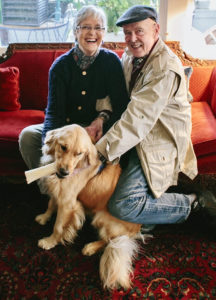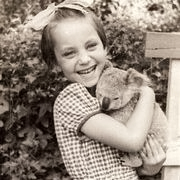Dr. Christine Aroney-Sine is the founder and facilitator of Godspace, an online community that grew out of her passion for spirituality, gardening and sustainability. She is also a popular speaker and the author of a number of books, including Rest in the Moment: Reflections for Godly Pauses (MSA 2016), Return to Our Senses: Reimagining How We Pray (MSA 2012), To Garden with God (MSA 2010), Light for the Journey (MSA 2010), GodSpace: Time for Peace in the Rhythms of Life (Barclay Press 2006), and Tales of a Seasick Doctor (Zondervan 1996). Christine trained as a physician in Australia and practiced in New Zealand before developing and directing the healthcare ministry for Mercy Ships. She spent 12 years travelling the world on board the M/V Anastasis, as part of a team providing much-needed medical help to those in need, before meeting her husband (author, theologian and futurist Tom Sine). Tom and Christine now live in an intentional, intergenerational community called the Mustard Seed House in Seattle, Washington.
Here are a few audio highlights from our lively conversation, with music by Meydän. (2:46)
Interview by Laura Locke
Kolbe Times: Welcome, Christine – I’m excited to chat with you today about a number of things. I just finished reading your latest book, The Gift of Wonder: Creative Practices for Delighting in God (IVP, 2019). I really enjoyed going through each chapter, reading and pondering, and also exploring the spiritual practices you suggest in the book – practices to help us live more mindfully, more creatively, and more joyfully. I started reading it shortly after the COVID-19 pandemic began to spread around the world. Discovering your book when I did turned out to be very good timing. I would say it helped me stay grounded in the good. So thank you for writing it!
Christine Aroney-Sine: You know, I’ve had a lot of people in the past few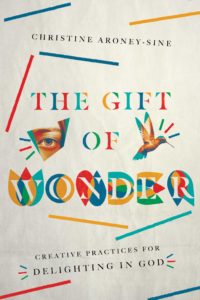 weeks tell me it’s been a helpful book for this challenging time we’re in. And in fact I’ve been asked to do some webinars on the benefits of “renewing our sense of wonder” in the trauma healing process. I think a little-recognized tool, during times like this, is the gift of wonder – because it helps keep us focused, and helps us recognize, I think, in the midst of these times that God is present, and God is at work. I think that it also helps us to realize that we’re part of something much bigger than ourselves, and this too shall pass. We need to be reaching out to each other with compassion and care – not just staying bound up in our own problems.
weeks tell me it’s been a helpful book for this challenging time we’re in. And in fact I’ve been asked to do some webinars on the benefits of “renewing our sense of wonder” in the trauma healing process. I think a little-recognized tool, during times like this, is the gift of wonder – because it helps keep us focused, and helps us recognize, I think, in the midst of these times that God is present, and God is at work. I think that it also helps us to realize that we’re part of something much bigger than ourselves, and this too shall pass. We need to be reaching out to each other with compassion and care – not just staying bound up in our own problems.
Kolbe Times: Yes. It’s so easy to just go inside to the dark places. Much better to awaken to the lovely places, in us and around us – which is what your book did for me.
Christine Aroney-Sine: I’m so pleased to hear that.
Kolbe Times: I’d like to ask if you could tell us a little bit about your childhood in Australia. You mentioned in your book that you and your parents and your three brothers did a lot of travelling around in your family caravan when you were young.
Christine Aroney-Sine: I like that question because I’m just entering a discernment process, and one of the things that I was reminded of, as I was getting into this time of discernment and reflection, was memories from my childhood – and particularly memories of some of those caravan trips! One incident in particular is very memorable. We were driving in the outback, and this fellow flagged us down, because he’d pulled off at the side of the road…and now he couldn’t remember which direction he’d been coming from! The features in the outback are all so much the same, and he hadn’t taken the time to notice anything distinctive when he pulled off the road. I thought, what a great analogy for the time we’re in it at the moment. I think a lot of us feel as though we’ve pulled off to the side.
Kolbe Times: That’s so true. And we feel directionless! “What day is it?” “Where am I going?”
Christine Aroney-Sine: I know! But as I look back on those early years, growing up in Australia – even though of course there were struggles – we had a wonderful childhood. We’d go away on trips for the whole of the summer holidays, which of course for us is December and January, and we traveled over a goodly part of Australia – though not out to western Australia, because at that time you had about a thousand miles of extremely bad dirt roads to get across there. But we travelled through a lot of the eastern side, and had wonderful times crammed into this little caravan, which we called “The Pimple” because it was so small. It had a double bed for my parents, and a little stretcher-type bed that we could move in for me…and then my brothers slept in the car if we didn’t have time to put up the tent. In those days putting up a tent wasn’t a five-minute thing. It took four people an hour to put it up! So, yes, lots of fond memories of that, and of seeing a lot of the country that I still call home, even though I’ve lived in the United States for 28 years. I am an American citizen now, as well as an Australian citizen. But I think there are certain things about the country that you grow up in that you just never forget.
Kolbe Times: That reminds me so much of my own childhood memories of camping with my family. We had this huge old army tent that my Dad picked up somewhere, and it also took forever to put up. Can you tell us a little about your family’s faith background, and your own faith journey?
Christine Aroney-Sine: My mother has a Scottish background, and she was Presbyterian. My dad is Greek, and he grew up Greek Orthodox. As kids growing up, we were definitely drawn more to the Presbyterian Church then to the Greek Orthodox, partly because the Greek Orthodox services were all in Greek so there was nothing that we could really identify with. It’s only been in the last few years that I’ve really learned to appreciate the Greek Orthodox faith, and the richness that Orthodox faith brings with it. But having parents from two totally different cultures builds a flexibility into you. I often say that I was a ‘third culture kid’ before anyone knew what that meant.
When I was 15, I made a statement of confession of faith, and then when I was at university I got involved in the charismatic movement. That was in the ‘60s and the charismatic movement was at its height. There was a real revival that went through the university. At one stage there were about thirty of us meeting regularly – many of whom are still walking with God. When I go back to Australia, I get together with a number of those people from my university days. So that was an enriching step.
Then I moved to New Zealand, where I practiced as a family physician. That’s also when I heard about and joined Mercy Ships. At that stage it was part of YWAM – Youth With A Mission – and thereby associated with the Assemblies of God because that was YWAM’s founder Loren Cunningham’s church. But Mercy Ships brought together people from many, many Christian traditions. So, you know, again, that was a tremendous broadening of experience for me, which has so enhanced my life. And, of course, I had the chance to travel to many different countries with Mercy Ships. Looking back, all of these experiences have enriched my life and my faith in ways that I’ve really appreciated, and have also provided a foundation for the kinds of things that I speak about and am passionate about these days as well.
Kolbe Times: As a teenager and a young woman, what led you to enroll in medical school and become a doctor?
Christine Aroney-Sine: Well, of my three brothers, two are doctors and the other is an electrical engineer. It was just expected in our family that you would go to university. But my first interest when I was thinking about university was geology! I was very interested in geology, but I was told that there were just no jobs for women. So the next possibility was medicine, and I’ve always been very glad that I did go into medicine rather than into geology because I’m such a people person!
So that’s how I got into medicine, and I have really, really enjoyed it – plus I’ve appreciated all the phenomenal experiences I’ve had because of it. But I do still collect rocks though…I love collecting rocks.
Kolbe Times: You became involved in Mercy Ships right at its beginnings. In fact, you established a hospital on board the M/V Anastasis, the first hospital ship owned by Mercy Ships, and developed and directed the medical and dental teams.
Christine Aroney-Sine: Yes, and I suffered from seasickness all the time! In fact, the name of my first book was Tales of a Seasick Doctor.
Kolbe Times: You’ve written about the joys of being a physician – being a witness to births, and healing, and lives being transformed because of medical interventions – both in your work as a family physician in New Zealand and also in your travels around the world as a doctor on Mercy Ships. But you would also witness a lot of trauma and desperation and death. That part of a physician’s life must be extremely difficult.
Christine Aroney-Sine: Yes, it can be very challenging. And it was particularly challenging during the times when we worked in refugee camps in Haiti, and on the Ivory Coast and the Thai-Cambodian border. That was where, in many ways, we witnessed more death than life. But the experience transformed my approach to life, because I began to think, “If this is the way so many people live, then what is God asking of me?” I think at the beginning I thought I would work on Mercy Ships for a couple of years and then go back to family practice in either Australia or New Zealand. But you know, being witness to the misery that we saw, especially in the refugee camps, shook me up. It shook me up to the extent of realizing that going back to family practice was not what God was calling me to. So those kind of challenging experiences can be life-changing because they help us face the real world. They also help us face our real selves – who we really are, and who God intended us to be.
Kolbe Times: You ended up working on board the Anastasia for 12 years, which is amazing – directing the healthcare ministry and travelling to countries in Africa, Asia, the Caribbean Islands, Central America, the South Pacific. I can only imagine the experiences you had in all those places, being part of a team that brought medical help to so many people who otherwise might not have received it.
Christine Aroney-Sine: Yes, the experiences we had were phenomenal. And I think that part of my personality is that I always move with a very strong sense of calling. I mean, it took us three years after I arrived to get the hospital functional, and the whole time I was on the ship I was seasick. But there was never any doubt in my mind that I should turn around and go home. Being part of that work – being able to help people who really needed medical care – it was, like, wow. It was a big wow. I’m awed at the privilege of what I’ve been able to be involved in over the years. As I said, there was this strong sense of “this is what God has allowed me to do.”
Kolbe Times: Travelling to so many places must have changed the way you looked at the world – recognizing the things that we all have in common, and yet also seeing the drastic differences in people’s life experiences.
Christine Aroney-Sine: Yes, for sure. I think that the more interaction we have with a diversity of cultures, the more well-rounded we become – and the more wholeness we find within ourselves, too. As you know, I love gardening, and I think, you know, the best garden is one in which there’s diversity. The plants do better when there are many different kinds, and I think we’re the same. It’s like, we do better when there are many different kinds of, as it were, “plants” in our garden. And all of us, you know, thrive much more when we’re open to that possibility.
have with a diversity of cultures, the more well-rounded we become – and the more wholeness we find within ourselves, too. As you know, I love gardening, and I think, you know, the best garden is one in which there’s diversity. The plants do better when there are many different kinds, and I think we’re the same. It’s like, we do better when there are many different kinds of, as it were, “plants” in our garden. And all of us, you know, thrive much more when we’re open to that possibility.
Kolbe Times: I’d like to go back for a moment to your experience of working in the refugee camps. Our theme for this issue is ‘vitality’ – and I think one thing you came to understand is that vitality is much more than just good physical health.
Christine Aroney-Sine: Yes, that’s true. Seeing the poverty and suffering up close in those camps turned my whole way of thinking about health upside-down and led me to think about it with a much broader perspective. I started wondering, “How does God bring wholeness to us as individuals, and as communities, and to the whole world?” I think that our personal vitality is connected to community, and I also think that environmental vitality is a very, very important step for all of us to take together. So out of that experience I developed an interest in a more spiritual approach to health, as well as an interest in sustainability. It gave me a sense that we can’t be made whole until everyone else is made whole – and in fact, until all of God’s creation is made whole.
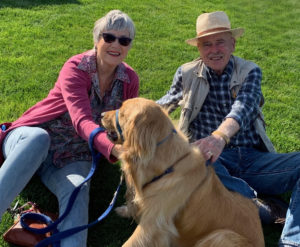 Kolbe Times: And then you met your husband, who lived in the U.S. – and you married in 1992 and now live in Seattle, Washington. That was a big change!
Kolbe Times: And then you met your husband, who lived in the U.S. – and you married in 1992 and now live in Seattle, Washington. That was a big change!
Christine Aroney-Sine: Yes. When I settled in the U.S., I decided I wouldn’t practice medicine, for several reasons. One of them was my health. I was ill when Tom and I married – I had developed chronic fatigue syndrome. But secondly, in order to practice medicine here, I would have literally had to re-sit my final exams, and do three years of residency. I thought, “No, I don’t think that’s where God is calling me.” And, you know by that stage, I was really pursuing this broader perspective of health and wholeness, from God’s perspective, that we were just talking about. Also, as a result of my illness, I was doing a lot of thinking about what I could or should have done differently in my life. I started to read about contemplative practices. Basically, I asked myself, “What was the rhythm of Jesus’ day? And what does that have to say to us today?” Well, I started looking at it, and I thought, “This sounds very much like the kind of monastic rhythm that was developed in the second and third centuries. So that’s where they got it from – Jesus!”
Interestingly, my entryway to all this was the fact that during that time, I was reading a series of books that were mystery stories set in the 12th century, which featured a monk called Brother Cadfael. Brother Cadfael had, in fact, three things about him that I found fascinating. He was an herbalist and healer in his community; he was always falling over dead bodies; and there was of course also the spiritual aspect of his life. Those books led me to start reading more broadly about contemplative practices, and to realize that this was very much something that gave a balance to the ‘workaholic’ pattern that tended to dominate the Protestant side of the world.
My husband Tom was very interested in Celtic spirituality, and I think that part of what I found with that was, you know, there was that real lovely kind of embrace of monasticism, and yet still a real outwardly focused activism. So that was a wonderful pathway for me. And then learning some of the Celtic prayers was like, this was something that not only started to feed my soul, but I think also started to make my soul blossom as I started to write my own prayers and liturgies. That enrichment, which was a much more ‘earthy’ kind of faith, you know, was what that introduced me to – which is so much a part of what I do now, and which I love.
Kolbe Times: That’s an interest that we share. My maternal grandparents were from Ireland, and a few years ago I visited Ireland for the first time. I could hear my grandparents’ voices in the Irish accents all around me!
Christine Aroney-Sine: That’s lovely!
Kolbe Times: That trip sparked something in me to also want to explore Celtic history and spirituality – I’ve been reading books and poetry and prayers, and visiting some great websites.
Christine Aroney-Sine: That’s so interesting. Iona, off the coast of Scotland, is like a spiritual home to Tom and I. We’ve been there several times and absolutely love it. A lot of the prayers I write have a real Celtic flavour to them. At the moment I’m re-reading some of John O’Donohue’s books, and find his writings and poems and prayers so enriching. His book To Bless the Space Between Us is such a lovely, lovely collection of blessings, and his other books are wonderful as well.
Kolbe Times: Yes, I happily discovered him a number of years ago as well. I also wanted to talk a bit about your website Godspace, which is one of my favourite places on the web to visit. If you were to describe your website, what might you say?
Christine Aroney-Sine: I would say it’s become a resource centre – and more and more it’s especially becoming a place for people looking for resources for worship services. But it’s also a place for people looking to increase their own knowledge about various things, such as Celtic Spirituality, Creation Spirituality, Justice, Hospitality, Spiritual Practices, Prayers. We also have a lot of reading lists. We’re continually working on ways to develop our online Resource Centre, so that people can more easily find what they’re looking for. As well, we have our Blog, which brings together a community of writers from literally all over the world. We have about 40 writers, and what I love about that is that it exposes our readers to different perspectives. I think we all need to be open to and hear from people that don’t necessarily think the same way we do.
Kolbe Times: Yes, I really enjoy reading the blog posts.
Christine Aroney-Sine: Oh good – I do as well. You know, I call myself a contemplative activist. I suppose, in a way, you could say our website, Godspace, is an expression of that. The resources are both for contemplation and for activism. We don’t follow the liturgical calendar on Godspace, but we do have resources for the liturgical calendar. We have blessings and prayers for Harvest and Thanksgiving and other seasons in our lives, but also for racial reconciliation and for disaster situations. We’re trying to help people to move out in different directions.
Kolbe Times: Let’s finish off by talking a little about your latest book The Gift of Wonder. I think it’s a beautiful example of a pathway to wholeness…and increased vitality. By exploring some creative spiritual practices in your book, it led me to consider new ways of connecting with God and of looking at the world, and also new ways of looking at myself. I’ve never thought of myself as an artist, but I do now…a little bit.
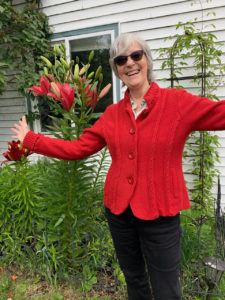 Christine Aroney-Sine: I believe we’re all artists! But I know what you mean. I didn’t recognize a lot of what I did as art either. To see that there is a creative spark in all of us is a wonderful discovery, and I think we do blossom as we start to discover that, and express it. Unfortunately, I think many of us have grown up in churches that tried to squelch creativity, you know, because they didn’t want people moving outside the boundaries of their way of doing things. And the moment you start to get creative, it pushes you both outside your own comfort zones, and sometimes the comfort zones of your church, you know. And I think as we start to discover joy and delight in God – and a God who also delights in us – that gives us a freedom that moves us in other directions as well. That direction, of course, is ongoing delight, in a God who isn’t puritanical but who laughs when we laugh, and plays when we play, and who delights in those things. As well, I think God loves it when we appreciate the awe and wonder of the world that He has created. That is something that I increasingly am aware of: that God delights in us delighting.
Christine Aroney-Sine: I believe we’re all artists! But I know what you mean. I didn’t recognize a lot of what I did as art either. To see that there is a creative spark in all of us is a wonderful discovery, and I think we do blossom as we start to discover that, and express it. Unfortunately, I think many of us have grown up in churches that tried to squelch creativity, you know, because they didn’t want people moving outside the boundaries of their way of doing things. And the moment you start to get creative, it pushes you both outside your own comfort zones, and sometimes the comfort zones of your church, you know. And I think as we start to discover joy and delight in God – and a God who also delights in us – that gives us a freedom that moves us in other directions as well. That direction, of course, is ongoing delight, in a God who isn’t puritanical but who laughs when we laugh, and plays when we play, and who delights in those things. As well, I think God loves it when we appreciate the awe and wonder of the world that He has created. That is something that I increasingly am aware of: that God delights in us delighting.
Kolbe Times: It such an interesting and beautiful circle that you paint for us. Can you speak a little about the impetus for this book? I think it was sparked by a Bible verse that you happened to be reading one day.
Christine Aroney-Sine: Yes – Matthew 18:3, which quotes Jesus as saying, “Unless you become like a little child, you cannot enter the kingdom.” I wish that I’d known about The Passion translation of that verse when I wrote the book. I’m paraphrasing, but the wording in The Passion translation says that we must have “the wide-eyed wonder of a child” to enter in. I love that.
So I posted Matthew 18:3 on Facebook, and asked the question, “What do you think are the childlike characteristics that make us fit for the kingdom?” I got this huge list of replies, which I pared down to the 12 characteristics that I explore in the book: things like imagination, play, nature, trust, curiosity, rest, and gratitude.
As I started to think about these characteristics and research them, I got more and more enthralled by this whole approach to spirituality. I had a strong feeling that these characteristics are important elements that many of us, including myself, have been missing. I also think that’s part of what Jesus meant. It’s not just that we need the trust of a little child – we need all these childlike characteristics to help us to find the wholeness and healing that God intends for us.
Kolbe Times: You ask many excellent questions for us to ponder in the book – one of which is “Have we dismissed the child within us?” You go on to make the case that rediscovering our inner child is actually essential for our spiritual health – and dare I say our physical and mental health as well.
Christine Aroney-Sine: Exactly. The Sierra Club did some research on this, when they took disabled vets on nature walks. They found that encouraging the vets to look around them with “awe and wonder” brought healing to those who were suffering from post-traumatic stress disorder (PTSD). Isn’t that interesting? I think that right now, in these times of COVID-19, quite a few of us are suffering from some level of PTSD as well, and we need these overlooked tools.
Kolbe Times: In fact, you mention in the book that you and your husband regularly go on “awe and wonder” walks.
Christine Aroney-Sine: Oh yes – they are the mainstay of our daily routine!
Kolbe Times: I guess an important part of that is simply taking the time to stop and truly notice what you’re seeing around you.
Christine Aroney-Sine: Yes, and noticing what a God we have, who is always present to us. And not just in nature! There’s also the chalk drawings that kids have done on the pavements, and the many little ways that we see people trying to encourage their neighbours. I think those things are worthy of our awe and wonder as well.
You know, part of researching and writing this book has been that it’s given me permission to play. A good example was one day recently when the weather was warm, the young person who lives in our basement apartment brought out some water balloons…and we all got into it, throwing the water balloons around. I’ve come to really believe that it’s in those kind of experiences that we start to understand who we are really meant to be.
Kolbe Times: I loved that you include many personal stories in the book, as well as beautiful quotes from other writers and thinkers and theologians – many of which I wrote down in my little “Quotes” notebook. The structure of each chapter was very thoughtful. Can you talk a little about that?
Christine Aroney-Sine: Well, I open each chapter with a prayer/poem that I’ve written, and then tell some stories that relate to the characteristic explored in that chapter, as well as getting into some research on the topic. Throughout the whole of each chapter are suggestions of creative practices that people can try, recognizing that we all have different things that appeal to us. I wanted to give a broad variety so that people all have possibilities that they can try. Then each chapter ends with a more detailed description of a creative practice that people can hopefully enter into.
Kolbe Times: I also appreciated that, at the end of the book, you gave helpful suggestions for groups who might want to go through this book together. I’m part of a women’s group that meets weekly – on Zoom at the moment! I’m going to suggest that we read your book together this fall.
Christine Aroney-Sine: Great! And by the way, we’ve also put up an online 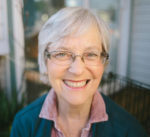 course on “The Gift of Wonder” on our website, with elements drawn from the book and also from other things that I’ve experienced since writing it. Many people have told me they’ve found it very helpful, too.
course on “The Gift of Wonder” on our website, with elements drawn from the book and also from other things that I’ve experienced since writing it. Many people have told me they’ve found it very helpful, too.
Kolbe Times: It’s been such a delight to talk to you. I really appreciate your time today, and also all the wonderful things that you are doing.
Christine Aroney-Sine: My thanks to you as well. It’s been lovely.
For more information about Godspace online courses, blogs, Christine’s books, and other resources, visit Godspacelight.com
Follow Godspace on Facebook , and follow Christine on Twitter and Instagram
Images courtesy of Christine Aroney-Sine


